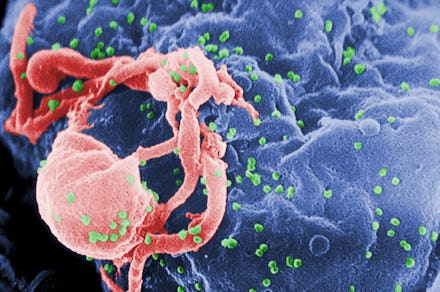HIV Is Powerful Enough to Beat CRISPR Gene Editing — But There's Still Hope

Within weeks of news that CRISPR/Cas9 gene editing could be the answer to conquering HIV, a new report says the human immunodeficiency virus can develop resistance to CRISPR's handiwork.
Not only does HIV turn off the parts of your immune system that attack it, but any time it's successfully attacked, it mutates and keeps the fight going. That's why, of the 78 million people who have HIV, around half of them die from AIDS-related causes.
The bad news was published Thursday in the scientific journal Cell Reports.
How HIV fights back: According to Dr. Chen Liang, senior author of the study and associate professor of medicine at the McGill University AIDS Center, when CRISPR/Cas9 successfully edits, or cleaves, the HIV-1 genetic sequence, the leftover virus mutates just enough so CRISPR can't recognize it. It's like the leftover HIV puts on a fake-mustache disguise before going back to work ravaging your immune system.
It's like the leftover HIV puts on a fake-mustache disguise before going back to work ravaging your immune system.
Instead of trying to edit one viral target, you'd have to hit multiple areas at the same time — like a shotgun instead of a sniper bullet. "In the old days, we used one drug, called monotherapy, but it was never successful," Liang said over the phone Thursday. "I assume if we target multiple sites in the HIV DNA, there's a good chance of achieving a long suppression of the virus."
But like the Notorious B.I.G. never said, mo' genetic targets, mo' problems.
By increasing the number of viral targets, you also increase the possibility of what's called off-target activity, or editing genes you didn't want to edit. "Recently, other labs found out they could improve the Cas9 enzyme with higher fidelity," Liang said. The key might be replacing Cas9 with another enzyme that edits DNA at a different site in the sequence, where the HIV-1 isn't close enough to mutate and assimilate.
According to Liang, there's hope. This is yet another example of HIV's destructive abilities. "Fortunately, the field is advancing very fast," Liang said. "I think CRISPR is easy and specific enough to use. I think we'll see better tools [to fight HIV] soon."